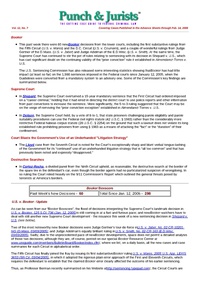Defendant pleaded guilty to possession with intent to distribute more than 50 grams of cocaine base, which was discovered during an investigation of a fire at his home. Two loaded handguns were also discovered during the investigation. The presentence report produced a sentencing range of 121-151 months. Defendant objected …
Here, the Court rejected a claim by inmates of a private prison which was under contract to the Wisconsin Department of Corrections that they were entitled to the benefits of the minimum wage provisions of the Fair Labor Standards Act, 29 U.S.C. §§ 201 et seq. (FLSA). It held …
More than a decade ago, the defendant in this case was originally convicted of multiple federal charges and sentenced to 15 terms of life imprisonment (which was later reduced to 5 terms of life imprisonment). In 2003, he decided to seek a further reduction in his sentence on grounds …
This case is noted for what is probably a very accurate (albeit disquieting) picture of the permissible scope of border searches in America post 9/11. Here, the defendant appealed from a conviction following a conditional guilty plea for importation of marijuana, after customs agents found ten brick-shaped packages containing …
This is another of a long line of cases which, to use of the words of the Supreme Court, “lies at the intersection of the two most fertile sources of federal-court prisoner litigation - the Civil Rights Act of 1871, Rev. Stat. § 1979, as amended, 42 U.S.C. § …
Defendants' appeals from judgments of the United States District Court for the District of Puerto Rico were consolidated. Both defendants were convicted after trial, along with two other codefendants, for conspiracy to distribute cocaine in excess of five kilograms, a violation of 21 U.S.C.S. § 846. The first defendant …
Here the Court held that the district court (Judge Farnan of the D.Del.) erred by requiring, as a condition of supervised release, that the defendant obtain mental health counseling at the discretion of his probation officer. That condition was both an impermissible delegation of judicial power and it was …
In this case, a slim majority of Supreme Court Justices has given notice that it has not yet completed its re-examination of the criminal sentencing process; and that some of the Supreme Court’s prior precedents may no longer be valid under the sentencing revolution that started with Apprendi v. …
Here the Court held that a civil forfeiture of the entire amount of currency seized from the defendants would be grossly disproportionate to the gravity of their currency reporting offense and thus violative of the Excessive Fines Clause.
Defendants were convicted of concealing more than $10,000 in currency …
Intervenors, two media companies, moved to intervene in the instant action and to obtain access to all sentencing letters and sentencing memoranda submitted to the court.
Of interest to intervenors were the numerous letters submitted to the court on defendant's behalf, all requesting leniency. The First Amendment did not …
In this case of first impression, the Eleventh Circuit rejected a constitutional challenge to a Georgia law requiring incarcerated felons to submit DNA samples "by taking blood, swabbing the inside of his mouth for saliva, or using any other noninvasive procedure" for a felon DNA database.
Here the Third Circuit held that the district court had erred when it upheld a state prison’s policy, which banned inmates' access to newspapers, magazines and photographs that were neither legal nor religious in nature, as reasonably related to legitimate penological interests.
